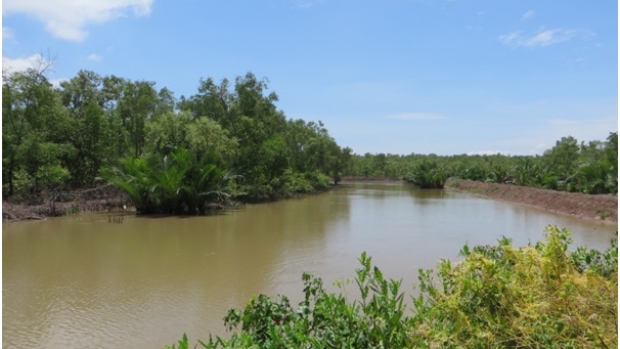Grants :: Small Grant Facilities :: Trial on polyculture of mud creeper (Cerithidea obtusa) and blood cockle (Anadara Granosa) under mangrove canopy in Thanh Phong Commune, Thanh Phu dist, Ben Tre Province
Trial on polyculture of mud creeper (Cerithidea obtusa) and blood cockle (Anadara Granosa) under mangrove canopy in Thanh Phong Commune, Thanh Phu dist, Ben Tre Province

Project area in Thanh Phong, Ben Tre, Vietnam, Thanh Phong, Ben Tre © IUCN Viet Nam
Objectives
The project aims to build up a pilot model on productive poly-culture of sea snail and blood cockle under mangrove canopy based on community’s co-management in Thanh Phong Commune, Thanh Phu District, Ben Tre Province.
Background
Due to the recent failure of shrimp farming in Thanh Phong district in Ben Tre province, many local households are put into poverty and in need of more diverse livelihood options. Some have shifted into farming mud creeper snail and blood cockles but the economic value is not high due to lack of technical approaches and knowledge.
Target beneficiaries
- 11 households will directly participate in the project
- At least 60 people will benefit from the sharing of project information and experience
Outputs
- 3 demonstration plots using different densities of the snail and blood cockle poly-culture under mangrove canopy
- Snail and blood cockles’ productivity of participating households will increase by 10% after the project
- 2 trainings for 60 people on poly-culture of snail and blood cockle under mangrove canopy
- 2 study tours and one farmer field school for 30 people
- 200 copies of technical guidelines
Accomplishments and challenges
The snail species has grown quickly and can be harvested; the profit gained from the model has increased by at least 10%. However, blood cockles have grown more slowly and their survival rate is not as high as in Ca Mau.
Since local people employed the pilot model of the project, mangrove protection and management work has been better done; therefore, this has contributed to protecting and sustaining existing mangroves and been of significance to prevention and minimization of climate change impacts.
Of 11 households involved in the project, four households were represented by women; during the two training courseson farming techniques and involvement in the model, women were also invited to be equipped with aquaculture. This would make women able to carry out economic activities like men and assist their husbands in developing household economy.
Contributions to cross-cutting themes
Climate change
Lessons Learned
Before implementing the project in a certain locality, there is a need to conduct a survey and collect data on natural and socio-economic conditions in the project area. In addition, the contact with the local authorities is very important because these agencies will provide support for the good implementation of the project.
It can be learnt from the project that it is not advisable to raise mollusc species in too deeply innundated waters. Salinity is another factor that should be considered. For Cerithidea obtusa farming, salinity gets increased in early December which is suitable time for stocking.
Project Facts
Country
Location
Thanh Phong Commune, Thanh Phu District, Ben Tre Province
Topic
Duration
10th Apr 2014 to 10th Apr 2015
MFF Grant Amount
365,440,000 VND
Implementing Partner
SOUTHWEST CENTRE FOR FORESTRY EXPERIMENT AND RESEARCH.
Representatives Contact: Huynh Trong Khiem
Address: 49 A, Hung Vuong Str, Ward 5, Ca Mau City, Ca Mau Province.
Tel: 0780. 3832978